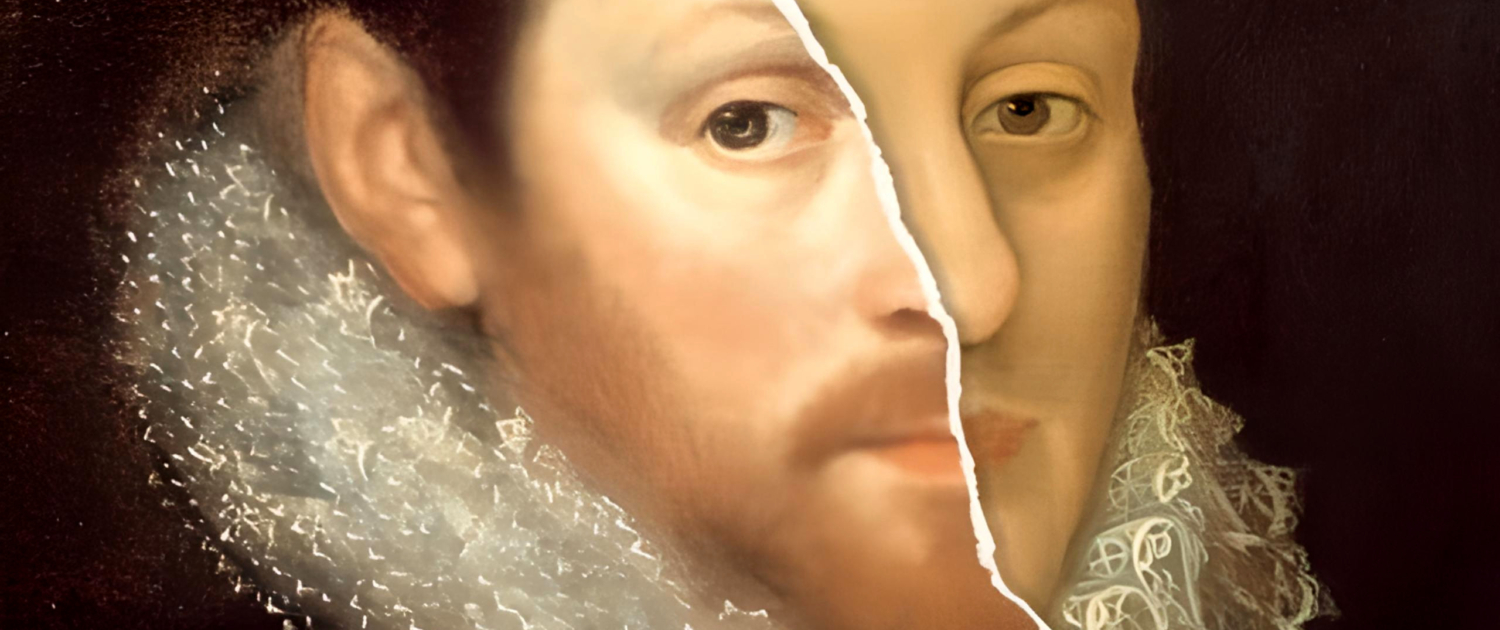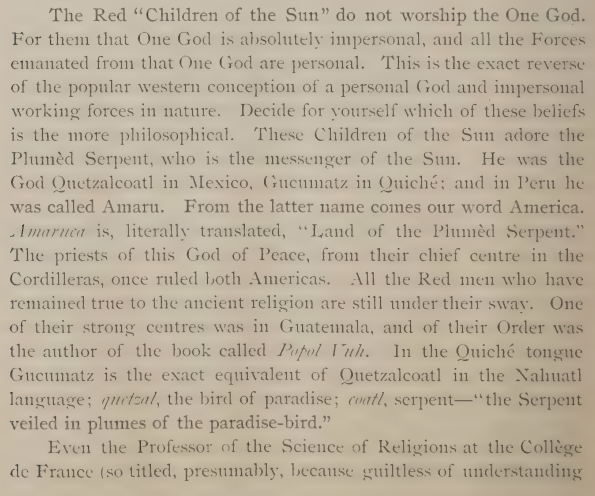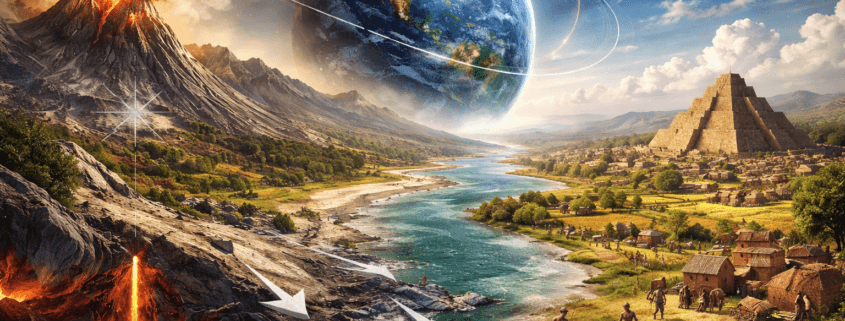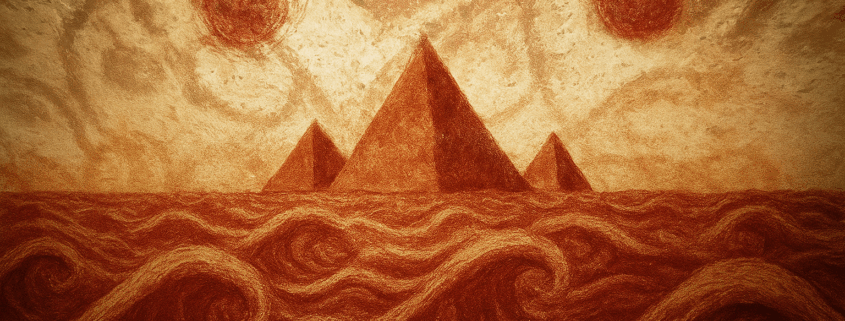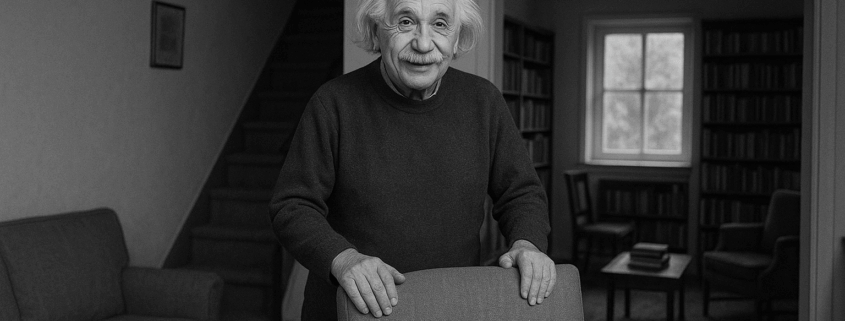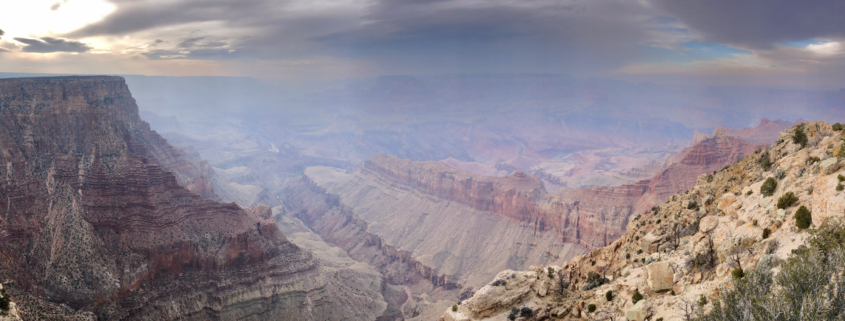Destiny and the Mysteries must win,
for they are on the side of the Great Plan.
Manly P, Hall, 1951
According to Masonic sources, the most important mystery of secret societies is an ancient plan, passed down for thousands of years by oral tradition, for the establishment of a world government — a “universal democracy” — a “New Atlantis.” In the early 1600’s, this plan for a new world order was in the keeping of Masons in the greatest commonwealth the world had ever known—the British Empire. English Masons believed that North America was the continent from which their New Atlantis would spring.
Most people believe that the legend of Atlantis is a myth. Yet the similarities between the account of the destruction of Atlantis and the biblical account of the flood of Noah are really quite remarkable. They appear to be the same event. The difference may be just one of perspective. From the vantage point of secret societies the destruction of Atlantis was a tragedy. Manly Hall claimed that the Atlantean legend is central to the philosophy of all secret societies. He describes Masonry as, “… a university, teaching the liberal arts and sciences of the soul… It is a shadow of the great Atlantean Mystery School, which stood with all its splendor in the ancient City of the Golden Gates.”
From the biblical point of view its destruction was a necessity because the pre-flood world had become so corrupt:
And God looked on the earth, and behold, it was corrupt; for all flesh had corrupted their way upon the earth,… I am bringing the flood of water upon the earth…. everything on the-earth shall perish
Atlantean authority Ignatius Donnelly wrote in 1882 that the similarities were so significant as to mandate that they were one and the same event:
The Deluge plainly refers to the destruction of Atlantis, and that it differs in many important particulars with the account given by Plato. The people destroyed were, in both instances, the ancient race that had created civilization; they had formerly been in a happy and sinless condition; they had become great and wicked; they were destroyed for their sins — they were destroyed by water.
Isn’t it interesting that it is this corrupt pre-flood civilization that the secret societies are working so hard to reinstate? Interesting though is the fact that the Bible tells us that Christ will return when the same kind of society exists again. Matthew 24:37-39 tells us:
For the coming of the Son of Man will be just like the days of Noah. For as in those days which were before the flood they were eating and drinking, they were marrying and giving in marriage, until the day that Noah entered the ark.
Whether or not one believes in the Atlantean legend, it certainly exists in literature. There is only one source of the Atlantis legend outside of Masonic circles—the account written by Plato about 400 B.C. This account is said to be derived from an even earlier oral account originating with a Greek philosopher named Solon, known as the father of the Greek democracy.
Solon was told the story of Atlantis around 595 v.c. while studying with the priests of the Temple of Isis located in Said, Egypt. The legend was passed in oral tradition for several generations before Plato heard it and wrote it down in the traditional form of the day, called a “dialogue.” This dialogue ts known as the Critias.
Although the account in the Critias is the oldest available reference to the legendary kingdom, it seems that additional information about Atlantis is still possessed by the highest initiates of the secret societies. Hall, a thirty-third degree Mason, the highest publicly-known Masonic ranking, gives us a detailed account of his own concerning just how Solon acquired his knowledge of Atlantis in his 1944 book, The Secret Destiny of America.
Although he does not provide the reader with the source of the story, Hall recounts that Solon, while visiting Egypt in search of wisdom, was accepted by the priests in the temple of Isis as a brother-initiate and was shown their secrets.
According to Hall’s undocumented, yet interesting account, the priests took Solon down a long series of ancient steps, hewn from living rock, that eventually opened into a huge subterranean chamber through which flowed part of the Nile River. The party boarded a small boat that was rowed by blind men to a tiny island far underground. On this island were two pillars made of a rare metal, said to be orichalcum, the fabled indestructible Atlantean material, which neither rusted nor deteriorated with age. Upon these two huge, inviolable pillars were curious writings in a mysterious language unknown to Solon.
Solon was told that the columns were placed there thousands of years earlier by a lost people who had vanished forever. He was told that the mysterious inscriptions on the columns were the laws of the Atlantean ancients, left there to steer mankind until the appointed time for the Atlantean civilization to flourish once again.
According to this account, at its peak, some 10,000 years before the Greek civilization, Atlantis was ruled in complete harmony by a cooperative commonwealth of ten kings, known as the Atlantic League. Seven of these kings ruled over the seven islands that actually made up what was called the “continent of Atlantis.” The other three kings of the Atlantean kingdom ruled over the other three known continents: Europe, Asia, and Africa.
One day the seven kings of Atlantis decided to conquer the other three continents. They invaded Greece and all of Europe about 10,000 B.C. This overt transgression of Atlantean law enraged the father of all the gods. In a single evening, Zeus caused the entire island of Atlantis, with some sixty million inhabitants, to sink beneath the waves.
In fact, in the record of almost every civilization for which ancient legends exist, the one thing they all hold in common is a flood tradition in the distant past. In 1933, historian Immanuel Velikovsky attributed the flood to a common astronomical phenomenon — a close passage of either Venus or Mars to the Earth.
According to Hall, with the demise of Atlantis went the “ideal pattern of government,” the secrets of which Masons have conserved through their oral traditions:
So complete was this destruction, that men forgot | there is a better way of life, and accepted the evils of war and crime and poverty as inevitable…. The old Atlantis is gone, dissolved in a sea of human doubts. But the philosophical empire would come again, as a democracy of wise men.
Solon was told that the mysterious columns were all that was left of the ancient Atlantean culture to guide the future “government of nations.” However, what Hall and Masons fail to point out is that this supposedly “ideal pattern of government” led to the destruction of old Atlantis. Can there be any doubt that if such a government is ever reinstalled, it will bring about the same tragic result?
Manly Hall explained why this Atlantean legend is so important to understanding the goals of those who are still striving to bring forth a new world order in America:
The league of the ten kings is the cooperative commonwealth of mankind, the natural and proper form of human government. The Atlantis [legend], therefore, is the archetype or the pattern of government, which existed in ancient days but was destroyed by the selfishness and ignorance of men.
Today, the elite of secret societies are still taught that bringing forth a new cooperative commonwealth of mankind — a new Atlantic League — is the natural and proper form of human government, and the highest calling to which a person can dedicate himself.
Christians well-versed in the Bible believe that this so-called “commonwealth of mankind” is, in reality, the dictatorship of the Antichrist, predicted in the Bible’s book of Revelation. In fact, there is a startling similarity between the Atlantean myth and biblical prophesy. Revelation 13:1 states:
And I stood upon the sand of the sea, and saw a beast rose up out of the sea, having seven heads and ten horns, and upon his horns ten crowns, and upon his heads the name of blasphemy.
According to noted biblical scholar Charles Ryrie, the ten horns of the beast are the ten kings mentioned in Daniel 7:24, who will rule over ten nations. Ryrie interprets the Bible as saying that one of these kings will be different, more brutal than the others, and he shall destroy three of the other kings. The Bible says that this most brutal king, referred to as the Antichrist, will “defy the Most High God, and wear down the saints with persecution, and try to change all laws, morals, and customs. God’s people will be helpless in his hands for three and a half years.”
The Atlantean legend seems to set the ideological foundation upon which all the secret societies rest. Whether it is the “cooperative commonwealth of the ten kings,” the “Philosophical Empire.” the “New Atlantic League,” the “New World Order,” or the “New Atlantis,” the meaning is always the same: to establish a so-called “enlightened” world government.
What is an “enlightened” world government? H takes a little digging, but the word “enlightened” is meant to describe a government tree of religion, or, as its proponents usually explain, a government free of “religious persecution” or “superstition.” Hall gave us the Masonic reasoning when he wrote the following in 1944 under the heading “The Democratic Tradition Preserved by Secret Societies”:
For more than three thousand years, secret societies-have labored to create the background of knowledge necessary to the establishment of an enlightened democracy among the nations of the world… The rise of the Christian Church brought persecution…driving the guilds of the secret societies into greater secrecy: but all have continued searching for human happiness under a variety of rituals and symbols; and they still exist.
Today, this concept is remarkably widespread among leading politicians the world over, and is embodied in the spirit of the current United Nations. Now lets take a look at the role of the secret societies in the earliest origins of America.
SECRET SOCIETIES IN THE ANCIENT AMERICAS
Secret societies have been active in most civilizations since the beginning of recorded history. Primitive secret orders have existed among African tribes, among the Eskimos, and throughout the East Indies and northern Asia. American Indians, the Chinese, Hindus, and even Arabs have elaborate religious and fraternal organizations.
Wherever they sprang up, secrecy was maintained in these groups for two reasons. First was to prevent condemnation and persecution in the event the rites they practiced were made public, A second purpose for secret societies was to create a mechanism for the perpetuation, from generation to generation, of policies, principles, or systems of learning, confined to a limited group of selected and initiated persons.
Ancient Masonic lodges have been discovered among the American Indians. Former newspaper editor and thirty-second degree Mason John Loughran recently found what he called an ancient Indian Masonic lodge at an Anasazi Indian archaeological site. Loughran writes:
The furniture was placed the same [way], and the area where the main rituals took place seemed eighty percent identical to the Masonic lodges in America now. The only difference was that these temples were round. Then] did some research and found out that in northern Africa the Masonic temples started out round.
In the ancient lodge, he was able to decipher symbols left by the Anasazi Masons that led him to a “locator device.” That device, in turn, led to a hidden library. In this library, there were fifty rock and clay tablets, which he dates between 1000 and 1200 A.D, written in what appears to be Arabic. It is interesting to note that the name Anasazi means “ancient ones.”
Even the name “America” may be the product of ancient American secret societies. In an 1895 edition of a magazine called Lucifer, published by the occult-promoting Theosophical Society, author James Pryse gave an interesting insight into the meaning of the word “America.” He said that the supreme god of the Mayan culture of Central America, known as Quetzalcoatl elsewhere, was known in Peru as Amaru. Amaru’s territory was known as Amaruca. According to Pryse:
From the latter comes our word America. Amaruca is, literally translated, “Land of the Plumed Serpent.” The Priests.of this God of Peace once ruled the Americas. All the Red-men who have remained true to the ancient religion are still under their sway.
Most historians attribute the name America to explorer Amerigo Vespucci, but Manly Hall claims that since the serpent is frequently symbolic of Lucifer, it is no exaggeration to extrapolate from this that America may well mean “Land of Lucifer.”
To the secret societies, Lucifer is always depicted as a benevolent, peace-loving god with nothing but the best intentions for the human race. In Greek mythology he was Prometheus, the titan who defied Zeus to bestow the gift of fire upon mankind, an act for which he was tortured mercilessly. Interestingly, the initiatory knowledge of secret societies is commonly referred to as “light” and associated with fire. Among Luciferians, God is seen as evil, trying to keep knowledge away from man. The same scenario was repeated in the Garden of Eden, when the snake explained to Adam and Eve that God didn’t want them to have knowledge that would make them wise.
In Central and South America, a land of dark-skinned natives, Quetzalcoatl was said to be a white man with a strong body, broad forehead, large eyes, and a flowing beard. He wore a miter on his head similar to the headdress worn by the Egyptian goddess Isis in ancient Egyptian drawings.
Quetzalcoatl dressed in long white robes reaching to his feet, which were covered with a design of red crosses.” This brings to mind the garb of the British “crusaders” and, as we now know, the Rosy Cross symbol is the one employed by another modern day secret society, the Rosicrucians.
Quetzalcoatl left the Americas, and entrusted his teachings and the purpose of his mission to a secret “Order of Priests” until the day when he returned to rule again. This is why, when Spanish explorers first set foot in Central America, they were greeted as returning gods, because native legend had predicted the return of the white-faced Quetzalcoatl.
SIR FRANCIS BACON (1561-1626)
If one man can be singled out as the person most responsible for the colonization of America, the honor would certainly fall to the head of both Masonry and Rosicrucianism of his era, Sir Francis Bacon. in the early 1600’s Bacon authored a novel entitled New Atlantis, which laid out the idea for a utopian society across the ocean from Europe where mankind could build a new civilization based upon the principles he believed to be those of the legendary lost continent of Atlantis, cherishing as he did the dream of a great commonwealth.in the New Atlantis.
Marie Bauer Hall claims in Collections of Emblemes, Ancient and Moderne that:
Truly the Sixth great Empire of the Western world had its inception with the advent of Sir Francis Bacon…the true father of democracy, the actual and true FOUNDER OF AMERICA…[and] wise guardian and protector of its history during the last three hundred years.
Born only sixty-nine years after Columbus “discovered” America, Bacon’s parentage is very controversial. He was born to Queen Elizabeth’s lady-in-waiting, Lady Ann Cocke-Bacon, wife of the Lord High Chancellor of England. But some Bacon scholars now believe he was, in reality, the first-born son of Queen Elizabeth and Lord Robert Dudley, the Earl of Leicester, and was merely adopted at birth by the Bacons, who had suffered the misfortune of a stillborn child at approximately the same time. That would have made Bacon the grandson of King Henry VII, and therefore the rightful heir to the British throne, Why the switch? Bacon’s father, Dudley, was secretly married to Elizabeth before she became Queen in 1558 at age twenty-five.’ It is well known that Elizabeth wanted to marry Dudley openly, but it was politically impossible because he was very unpopular. His first wife died suddenly under suspicious circumstances in 1560, the year before Bacon’s birth. Throughout her reign, Elizabeth was haunted by this persistent rumor that she had given birth to bastard children, Bacon being the most prominent.
In any case, at maturity, Bacon, an English lord, became well-versed in the occult, and even claimed to be so mystically adept as to be in possession of “all knowledge.”
Marie Hail described Bacon in glowing terms:
He is the Founder of Free Masonry…the guiding light of the Rosicrucian Order, the members of which kept the torch of true universal knowledge, the Secret Doctrine of the ages, alive during the dark night of the Middle-Ages. Bacon had been initiated into the new liberalism represented throughout Europe by Secret Societies of intellectuals dedicated to civil and religious freedom….Later, when the moment was propitious, he threw the weight of his literary group with the English colonization plan for America…cherishing as he did the dream of a great commonwealth in the New Atlantis.
Though born a half century after the death of Columbus, the ciphers Columbus used were later to be called “Baconian-ciphers.” This secret method of communication involved the seemingly random use of italics, and the use of subtly different type styles to convey coded messages. Sometimes even single letters within words were italicized or had subtle font changes. Entire volumes have been devoted to the deciphering of these coded messages, many of which are available only in the rare books section of the Library of Congress.
There is evidence suggesting that Columbus was a member of the same secret society that Bacon did in his later days. The similarities between the two are so remarkable that Lord Bacon has even been referred to as the “little Columbus of literature.”
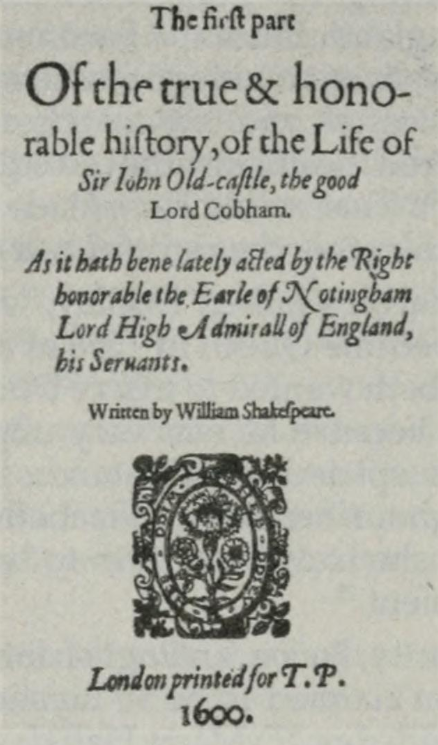
Original Shakespearean title page circa 1600.
Bacon was very secretive. Although he strove mightily to propagate the “New Atlantis” idea, like many others involved in the plan since, he preferred to remain in the background as much as possible. The leaders of the Great Plan have always been strictly cautioned against trying to bring their plan to fulfillment too quickly:
The Great Plan reached the Western Hemisphere through a series of incidents. Many-early explorers and colonizers are known to have been associated with Secret Societies…Some of the colonizers were probably unaware of the parts they were playing, and the settlements which they founded: remained for generations without the strength or security to advance ideological programs. The work, then as always, was in the hands and keeping of a few initiated leaders. They were responsible for the results, and they built slowly and wisely, thinking not of their own days or of their reputation, but of the future in which the Great Plan would be fulfilled.
Bacon’s novel, New Atlantis, was published the year after his death in 1527 by his trusted secretary, William Rawley. Hall described some of the hidden Masonic meanings contained in the New Atlantis:
On the title page is a curious design. It shows the figure-of an ancient creature representing Time.drawing a female figure from a dark cavern. The meaning is obvious. Through time, the hidden truth shall be revealed. This figure is one of the most famous-of the seals or symbols of the Order-of the Quest. Contained within it is the whole promise of the resurrection of man, and the restitution of the divine theology.
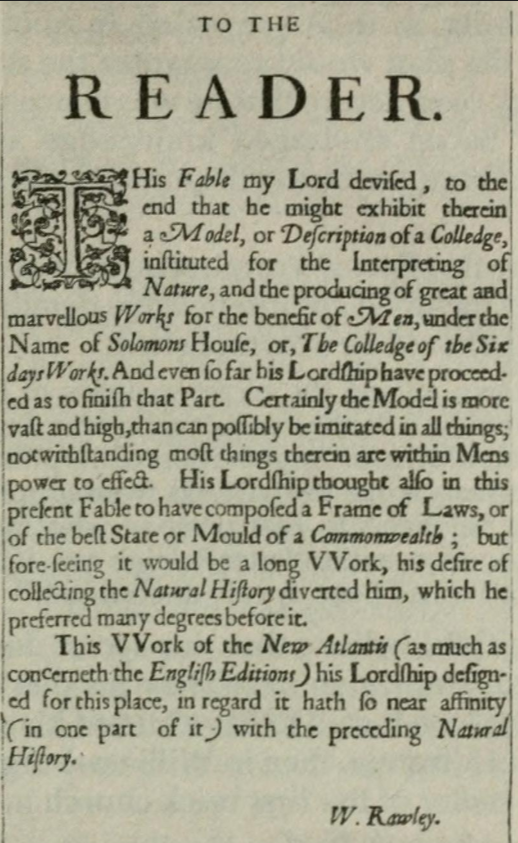
William Rawley’s Forward to Sir Francis Bacon’s New Atlantis, circa 1627 (courtesy of the Library of Congress)
Baconian scholar and Masonic enthusiast Marie Bauer Hall believes this Great Plan has been perpetuated by an international group of only the highest initiates of the secret societies. She wrote:
Perpetuation of the great plan was secured by secret tradition among an inner group of Initiates unknown to the outer Order at large, and patterned…in Bacon’s “New Atlantis.” This inner group counts a small number of members in all the countries of the Western Hemisphere. They have re the lamp of the Muse burning during the last three hundred years.
There is some controversy over why New Atlantis was never published in Bacon’s lifetime. Although most authorities believe it was unfinished, Manly Hall offers another interesting view:
The book was actually completed but was never published in full form because it told too much. The final sections of Bacon’s fable are said to have revealed the entire pattern of the secret societies which had been working for thousands of years to achieve the ideal commonwealth in the political world.
Bacon formulated a complex and far-reaching plan to reorder the world and everything in it. As revealed in another of his books, Instauratio Magna, the plan would reorganize the sciences and restore man to that mastery over nature that he was conceived to have lost by the fall of Adam. Bacon envisaged knowledge as a pyramid with natural history as its base, physics as the middle, and metaphysics as the vertical point.
Some experts say that Bacon wrote a sequel, or at least a second part, to New Atlantis that included comprehensive details and timetables of how the Great Plan should be accomplished:
It is well known among the secret societies of Europe that the second part of the New Atlantis exists. it includes a description of…the crests and the coats of arms of the governors of the philosophic empire. It may be for this reason that the writings were suppressed. for these crests and arms belonged to real persons who might have been subjected to persecution, as Sir Walter Raleigh was, if their association with the secret order had been openly announced.
The initiated faithful believe that this secret document still exists and was brought to Jamestown in 1653 by his descendant, Nathaniel Bacon. Nathaniel Bacon is said to have buried his ancestor’s material in the new capitol of Virginia, then in Williamsburg, in a great vault beneath the tower center of the first brick church in Bruton Parish.
This is now known as the Bruton Vault and has been the subject of great speculation and treasure hunting ever since. Incidentally, it was Nathaniel Bacon who instigated the first “revolution” in America. Later that year, in 1676, exactly fifty years after Lord Bacon’s death, and exactly a century before the American Declaration of Independence, Nathaniel Bacon burned Jamestown and seized the Virginia colony from England by force. This was known as Bacon’s Rebellion. His short-lived revolution died shortly thereafter when he died unexpectedly.
Lord Bacon was revered by Thomas Jefferson as one of the three great men of history, along with Isaac Newton and John Locke. Some Baconian scholars believe that Jefferson was the last to examine the contents of this vault, and that it has been lost since then.
THE “NEW ATLANTIS”
British exploration in America began in 1585 when Sir Walter Raleigh, an adventuring British nobleman, mounted an expedition to colonize Roanoke island, off the-coast of what is now North Carolina. The twenty-four year-old Raleigh was already a member of a secret society which would dater become known as the Baconian Circle. This circle, of course, believed that America was to be the glittering “New Atlantis” promised for centuries by secret societies.
So great was the clamor for the settlement of America which the Baconian Circle had set up in England, that Raleigh had no trouble recruiting candidates fora new expedition as “every man in Europe had it ‘on good authority’ that the Indians used chamber pots of solid gold, encrusted with rubies and diamonds.”
Once they arrived, however, the new colonists found no gold like that which the Spanish had discovered in Central and South America. Under constant attack by hostile Indians, they were eventually wiped out.
After the failure of Sir Walter Raleigh’s expedition in 1585, it took a generation before the British were ready to mount another attempt to colonize America. This time, the only way to stir interest in the new colonizing effort was to portray the expedition as a great work for God, through which the souls of countless Indian savages could be saved.
The “Virginia Company” was duly formed, with Francis Bacon as one of its early members. In the preamble to the Company’s charter, King James I — who was also busy authorizing his own English translation of the Bible — justified the new expedition by stating that it had been organized for the “propagating of Christian religion to such people as yet live in darkness and miserable ignorance of the true knowledge and worship of God, and may in time bring the infidels and savages, living in these parts, to human civility and to a settled and quiet government.”
It is interesting to note, however, that of the first party of 144 men, only one minister, Rev. Robert Hunt, was included. The colonists landed in Jamestown on May 14, 1607. Fully half the party were English gentlemen in search of easy riches, who were totally unable to cope with the unbroken wilderness. Unfortunately, their code of conduct forbade them from doing any physical labor. Among the early arrivals were jewelers and a perfumer.
The Reverend Hunt tried in vain to rally the gentlemen to help with the necessary tasks of the colony, and put their faith in God instead of gold. But no crops were planted that summer. In fact, it would be twenty years before the colony would plant a crop large enough to sustain itself.
When food rations ran out, and the gentlemen grew hungry, they went to the Indians and traded for food. Were it not for the unusual tolerance of the mighty Indian chief, Powhatan, the little colony would surely have starved in the first few years. As it was, in less than two years, only thirty-eight of the initial 144 men remained alive in Jamestown.
Meanwhile, back home in England, the leaders of the secret societies were in.an uproar. They tried to‘suppress letters. and other accounts of what was really happening to the beleaguered Virginia colony,but the truth could not be quashed. As a result, fund-raising for a rescue mission to resupply Jamestown was very difficult. When finally launched in 1609, the nine-ship fleet managed to sail into a hurricane, and its flagship ran aground on the island of Bermuda.
Shakespeare’s play, “The Tempest,” which made its debut in 1611, was said to have been inspired by this incident. The theme of the famous drama was that there was a magical isle across the seas where nature brought forth such an abundance that no man would have to work, and the concept of personal property would be dissolved.” In the play, the “idealistic yet honest” old counselor, Gonzalo, muses that if he had a plantation on that luxuriant isle he would design it along communal lines and nature would supply the rest:
All things in common Nature should produce
Without sweat, or endeavor: treason, felony,
Sword, pike, knife, gun, or need of any engine
Would I not have: but Nature should bring forth
Off its own kind, all foison, all abundance
To feed my innocent people.
SHAKESPEARE AND BACON
Over the centuries, hundreds of books have been written asserting that the plays attributed to William Shakespeare were in reality written by Lord Francis Bacon. The Library of Congress has an entire card catalog drawer full of hundreds of entries on the subject in its rare books section. If Bacon did write the Shakespeare material, and was able to keep it a secret for four centuries, then his importance to those who were privy to the secret in today’s world would be greatly enhanced.
There is no doubt that someone named William Shakespeare did exist. There is no doubt, however, that he was a commoner, and little doubt that he was illiterate. Yet the plays attributed to him show a vast knowledge of English court etiquette, numerous foreign languages, and a masterful command of the English language. Critics of the Bacon-Shakespeare connection have trouble explaining away these discrepancies. Masonic researcher Marie Bauer Hall maintains:
Sir Francis Bacon is the only man of his period who could have written the plays. William Shakespeare, the Stratford man, most definitely could not have written them, because it has been proved, time and again, beyond the shadow-of a doubt that William Shakespeare could not read or write. In fact, the only evidence that William Shakespeare was literate at all consists of five alleged signatures appearing in this will.
Mark Twain was certainly convinced that the historic William Shakespeare was not the real author of the Shakespeare material. in a 1909 booklet entitled Is Shakespeare Dead? he wrote:
Nothing that even remotely indicates that he was ever anything more than a distinctly common-place person; an actor of inferior grade, a small trader in a small village that never regarded him as a person of any consequence, and had forgotten him before he was fairly cold in his grave.
Why perpetrate such an elaborate hoax? Since many of the plays depicted real scandals in the British court involving Bacon’s own estranged family, his authorship would have to be concealed.
For example, according to both Marie Bauer Hall and Baconian scholar Elizabeth Wells Gallup, Bacon had a younger brother, Robert Devereux, the second child of the union between Lord Dudley, the Earl of Leicester, and Queen Elizabeth. Devereux was also sent for adoption by the star-crossed couple. However, he himself later had an affair with Elizabeth, his mother, and the two may have conspired to kill Dudley.
When Bacon learned the facts of his birth, at about age sixteen, he confronted the Queen with them. In a fit of anger, she admitted her motherhood, but immediately sent Bacon to France, and took action which permanently barred him from the throne.
In an incredible irony, Devereux was later accused of treason for trying to raise the City of London in revolt against the Queen — his mother. For this he was tried and executed in 1601. During the trial, it fell upon Lord Bacon to serve as the Queen’s attorney, prosecuting and condemning his own brother, Robert, to death.
Assuming all this is fact, Shakespeare’s Hamlet takes on a stunning realism if considered as an attempt by Lord Bacon to recount the tragic story of his own family. What Bacon desperately needed was a cover.
He needed a substitute author — a pen name only, not a ghostwriter — to allow him to tell his incredible story in a manner that would not endanger either himself personally, or his mother’s ability to maintain the throne of England. Hall claimed that such a stand-in would need to be:
An ignorant outsider—who could take the consequence of authorship in case of possible detection….Such a man was found in William Shakespeare, a groom in the employ of Sir Francis Bacon‘s father, the Earl of Leicester.
At some point, the historic William Shakespeare did-come into a substantial sum of money. According to Marie Bauer Hall, “In 1602, he returned to Stratford a wealthy. man and purchased one hundred seven acres of land He also helped his father in the purchase of a coat of arms under false pretenses.”
Shakespeare died in 1616, at age fifty-two, supposedly after a drinking bout with Ben Jonson, the famed English playwright and poet.
Jonson was a close friend and contemporary of Lord Bacon, though eleven years his junior. Jonson was asked to terminate the deception by “retiring” the historical William Shakespeare prematurely. Hall stated that Jonson admitted he “put arsenic in the nitwit’s beer.”
Jonson wrote of Bacon fondly, however: “Of greatness he could not want.” But of the death of Shakespeare, supposedly the greatest playwright of all time, Jonson, and all his colleagues who should have known him well, would write nothing:
Shakespeare’s death was ignored by all contemporary authors, though his plays were glorified….At his death there was not a book or a desk in his possession. There is no mention of any manuscript in his will….The first folio was printed seven years after his death. At the time no relations or heirs made any claims. Seventeen plays were not published until after his death, yet no provisions are made in his will for these plays. Though miserly, he never sought remuneration for his plays.
Elizabeth Wells Gallup, a cryptologist who spent years deciphering Bacon’s coded messages in the seemingly random use of italicized words and letters in original editions of Bacon’s and Shakespeare’s works, came to the same conclusion. Writing in 1899, she said:
The proofs are overwhelming and irresistible that Bacon was the author of the…immortal plays and poems put forth in Shakespeare’s name…. They came from the brain of the greatest student and writer of that age, and were not a “flash of genius” descended upon one of peasant birth, less noble history, and of no preparatory literary attainments.
Why is Bacon’s connection to Shakespeare so important? If true, then neither Lord Bacon’s genius nor his influence on present day secret societies can be underestimated. Imagine, if you will, a man so clever that he could not only author the greatest body of literature produced, but keep his authorship a secret for centuries. It is no surprise then that secret societies of today are so respectful of his plan for a New Atlantis.
Manly Hall claims that a Baconian secret society was set up in America while Jamestown was still floundering. Membership soon spread into South America in the person of legendary revolutionary Simon Bolivar. Hall stated that the Bacon group was also very powerful in Germany, France, and the Netherlands. Although secret societies played a significant role in the British colonization of America, with colonization came a force that was to bedevil their well laid plans for the New World Order — Christians. Unlike the greedy dandies of Jamestown, they came with a spirit of self-sacrifice, and consequently flourished. Today, as then, it is Christians who are the major stumbling block to the plans for the rise of their New World Order. Through the years, this concept has remained the same: to unite all nations under a single sovereign world government.


